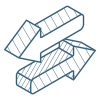Relevance for DT
Cooperation in standard-setting will be a key driver for innovation and instrumental for the implementation of shared values & joint objectives on a technical level. We want commonly agreed requirements to avoid fragmentation and ensure safe, open, transparent and fair development of technologies. We see technology standards as an important factor in strengthening competitiveness of European industries. In the past, the telecommunications sector in general and DT in particular have actively contributed to the work of international standardization organizations. We intend to maintain this engagement with regard to emerging technologies such as 5G/6G, cloud/edge, O-RAN, AI and blockchain. With our background, we can contribute specifically on issues that are related to connectivity and data flows.
Recommendations:
O-RAN: Deutsche Telekom is strongly committed to the development of Open RAN as the technology of choice for future mobile networks. Open RAN will help drive stronger, more resilient supply chains and platforms, as well as promote competitiveness and technology leadership. Open and disaggregated architectures, such as Open RAN, give operators the flexibility to extend 5G to more users in a cost-effective, secure and energy efficient way while avoiding vendor-lock in and supply dependencies. This flexibility will accelerate innovation, faster rollout and service creation across industries, for example in areas such as telemedicine and smart factories. To this end, we encourage the EU and US to work together in promoting a secure, diverse, and sustainable ICT supply chain, including by making Open RAN a strategic priority in their bilateral discussions.
AI: A proportionate and targeted regulation for the use of AI systems will lead to trust among citizens and create legal certainty that is needed for uptake. While common principles to create trust and protect fundamental rights should be found jointly on a political level, technical implementation is dealt with best by standardization organization. We are in favour of a risk based approach that focuses on regulating the use of high-risk and prohibited AI systems. There should be a common understanding how to structure these risk categories and corresponding obligations. The main focus should be on opaque, black box AI, which is why explainability and transparency are of particular importance. Both aspects could solve problems linked to liability. DT is in favour of a harmonized approach instead of fragmented regulation. The enforcement structure should allow for swift and reliable guidance.
Data Standardisation: One obstacle that is limiting greater inter-sectoral data exchange is a lack of standardization and a consistent description of industry data (metadata). In many cases, data has no "language" in common. For this reason, we support harmonized requirements with regard to technical specifications for B2B data sharing. This is crucial to improve interoperability and data exchange across industrial sectors as well as across jurisdictions. We support the development of uniform standards for data interoperability for selected sectors. These standards should be elaborated by standardization bodies including involvement from industry and the public sector.
(26 Jan 2022)
- Log in to post comments

